初中英语重点句型
初中英语重点句型总结

初中英语重点句型总结1. Have you finished your homework?2. What's your favorite subject in school?3. I need to practice my English more.4. Can you help me with this math problem?5. I don't understand this science concept.6. Let's review the vocabulary words for the test.7. We have a history project due next week.8. Have you read the assigned reading for English class?9. Do you have a pencil I can borrow?10. The teacher will go over the instructions again.11. How do you say this word in Spanish?12. I'm struggling with my French pronunciation.13. We are going to learn about the solar system in science class.14. The music class is going to have a performance next month.15. My art teacher is very encouraging.16. We have a lot of assignments to complete by the end of the week.17. The school library has many resources for research.18. I enjoy playing basketball during PE class.19. The school cafeteria serves lunch at 12 p.m.20. Can I join the after-school club for drama?21. We have an assembly in the gym this afternoon.22. Students need to wear a school uniform.23. The class will have a field trip to the science museum.24. It's important to study for the upcoming exams.25. I want to participate in the school talent show.26. The school year is divided into two semesters.27. We have an early dismissal on Friday.28. The school bus will pick us up at 7 a.m.29. The teacher will give us a pop quiz today.30. I'm looking forward to the school dance next week.31. Can you pass me a sheet of paper, please?32. I need to sharpen my pencil.33. Please raise your hand before speaking.34. I have a question about the assignment.35. The teacher will hand back our tests tomorrow.36. The school bell rings to signal the end of class.37. We have a fire drill next week.38. I forgot to bring my textbook to class.39. The school counselor is available to talk to students.40. Are you going to the school football game this Friday?41. I'm going to run for student council president.42. The school is hosting a bake sale for charity.43. Can you pass the ruler to me, please?44. The school principal will make an announcement overthe intercom.45. Students need to be in their seats when the bell rings.46. Can I borrow your calculator for my math test?47. We have a group project for history class.48. I'm going to try out for the school play.49. The school choir is going to perform at the local festival.50. Do you have any spare change for the vending machine?51. The school nurse can give you a bandage for your cut.52. We have a school-wide assembly next month.。
(完整版)初中英语重要句型及语法
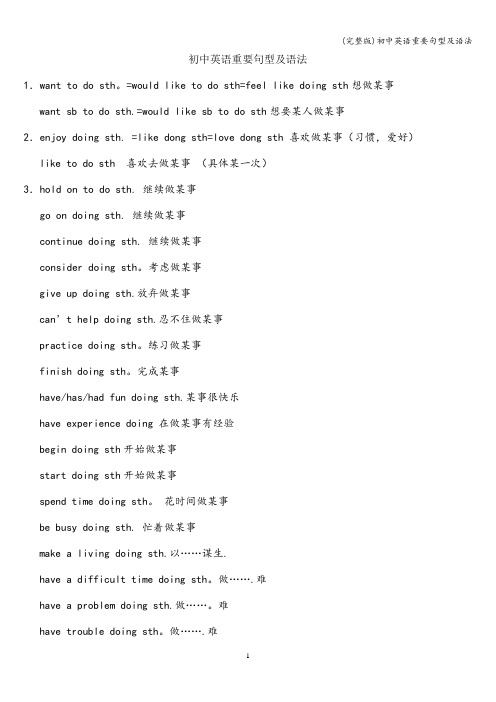
初中英语重要句型及语法1.want to do sth。
=would like to do sth=feel like doing sth想做某事want sb to do sth.=would like sb to do sth想要某人做某事2.enjoy doing sth. =like dong sth=love dong sth 喜欢做某事(习惯,爱好)like to do sth 喜欢去做某事(具体某一次)3.hold on to do sth. 继续做某事go on doing sth. 继续做某事continue doing sth. 继续做某事consider doing sth。
考虑做某事give up doing sth.放弃做某事can’t help doing sth.忍不住做某事practice doing sth。
练习做某事finish doing sth。
完成某事have/has/had fun doing sth.某事很快乐have experience doing 在做某事有经验begin doing sth开始做某事start doing sth开始做某事spend time doing sth。
花时间做某事be busy doing sth. 忙着做某事make a living doing sth.以……谋生.have a difficult time doing sth。
做…….难have a problem doing sth.做……。
难have trouble doing sth。
做…….难keep on doing sth. = keep sb. doing sth。
不停地做某事4.be good at doing sth 擅长于做某事do well in doing sth擅长于做某事thank you for doing sth 感谢做某事thanks for doing sth感谢做某事be used for doing sth 被用于做某事be used to doing sth 习惯做某事how about doing sth 做某事怎样what about doing sth 做某事怎样put off doing sth推迟做某事take pride in doing sth.以……为自豪by doing sth通过做某事be afraid to do sth害怕做某事be afraid of doing sth害怕做某事be terrified of doing sth. 害怕做某事5.be doing sth。
初中英语学习必背的62个句型,句句经典!

句型1:There+be +主语+地点状语/时间状语 There’s a boat in the river. 河里有条船。
句型2:What’s wrong with+sb./sth.? What’s wrong with your watch? 你的手表有什么毛病? 句型3:How do you like...? How do you like China? 你觉得中国怎么样? 句型4:What do you like about...? What do you like about China?你喜欢中国的什么? 句型5:had better(not)+动词原形 You’d better ask that policeman over there. 你最好去问问那边的那个警察。
句型6:How+adj. / adv. +主语+谓语! What a/an+adj. +n. +主语+谓语! How cold it is today ! 今天多冷啊! What a fine picture it is! 多美的一幅图画呀! 句型7:Thank+sb. +for (doing) sth.Thank you for coming to see me. 感谢你来看我。
句型8:So+be/ 情态动词/ 助动词+主语 He is a student. So am I. 他是一个学生,我也是。
句型9:... not ... until ... He didn’t have supper until his parents came back. 直到他的父母回来他才吃饭。
句型10:比较级+and+比较级 The baby cried harder and harder. 那孩子哭得越来越厉害。
句型11:the +比较级,the +比较级 The more one has,the more one wants. 越有越贪。
初中英语重点句型结构
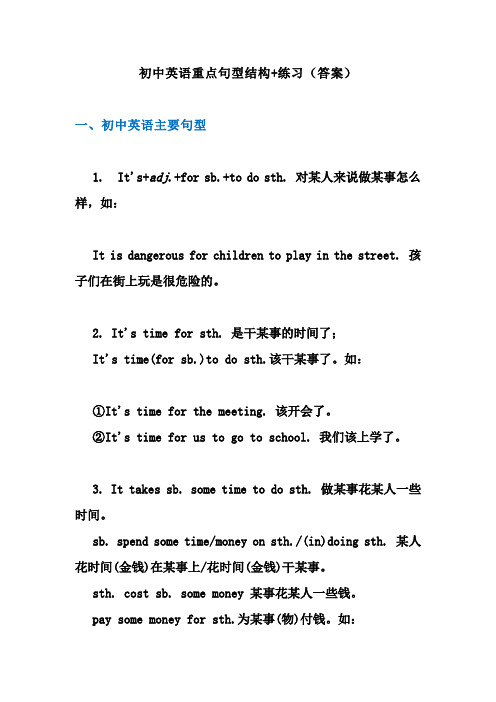
初中英语重点句型结构+练习(答案)一、初中英语主要句型1. It's+adj.+for sb.+to do sth. 对某人来说做某事怎么样,如:It is dangerous for children to play in the street. 孩子们在街上玩是很危险的。
2. It's time for sth. 是干某事的时间了;It's time(for sb.)to do sth.该干某事了。
如:①It's time for the meeting. 该开会了。
②It's time for us to go to school. 我们该上学了。
3. It takes sb. some time to do sth. 做某事花某人一些时间。
sb. spend some time/money on sth./(in)doing sth. 某人花时间(金钱)在某事上/花时间(金钱)干某事。
sth. cost sb. some money 某事花某人一些钱。
pay some money for sth.为某事(物)付钱。
如:① It took me two hours to write the letter. 写这封信花了我两小时的时间。
②He spends half an hour(in)reading English every morning.他每天早上花半小时读英语。
③ He spends one hour on the housework every day. 他每天花一小时做家务。
④ The bike cost me 500 yuan. 这辆自行车花了我500元。
⑤ I spent 500 yuan on the bike. 我买这辆自行车花了500元。
⑥ I paid 500 yuan for the bike. 我花了500元买这辆自行车。
初中英语重要的60个句型

初中英语重要的60个句型在初中英语学习阶段,句型和语法、词汇、短语一样重要。
掌握一些核心句型,对于学习和考试可以起到事半功倍的效果,写作文时也不会再发愁句子该怎么写了!句型1:There+be +主语+地点状语/时间状语There’s a boat in the river.河里有条船。
句型2:What’s wrong with+sb. / sth. ?What’s wrong with your watch?你的手表有什么毛病?句型3:How do you like...?How do you like China?你觉得中国怎么样?句型4:What do you like about...?What do you like about China?你喜欢中国的什么?句型5:had better(not)+动词原形You’d better ask that policeman over there.你最好去问问那边的那个警察。
句型6:How+adj. / adv. +主语+谓语! ;What a/an+adj. +n. +主语+谓语! How cold it is today !今天多冷啊!What a fine picture it is!多美的一幅图画呀!句型7:Thank+sb. +for (doing) sth.Thank you for coming to see me.感谢你来看我句型8:So+be/ 情态动词/ 助动词+主语He is a student. So am I.他是一个学生,我也是。
句型9:... not ... until ...He didn’t have supper until his parents came back.直到他的父母回来他才吃饭。
句型10:比较级+and+比较级The baby cried harder and harder.那孩子哭得越来越厉害。
初中英语重点句型100个

初中英语重点句型100个1、Welcome back to… eg. Welcome back to school/the factory. Welcome back home.2、It is much better than having class3、Some of the apples are hard to reach.4、Work must come first.5、The other students in the class keep their eyes closed例如:Don't keep your mother waiting Keep the students in/out.6、You had better stay at home.7、You'd better stay at hom, hadn't you? You'd better not stay at home.8、Walk(Go) along、down the road/street, and take the first turning on the left. =Turn left at the first turning9、We live in a place named Da Lian.10、I like to keep busy.11、Better late than never.12、There was a telephone call for you. Here is a letter for you.13、Thank a lot/very much/you for asking me to your party.14、Which is t he way to….?=How can I get to/reach/arrive in(at)/find….? Is there a …..near here?=Where is the…..?=Could you tell me the way to…..?15、It's too dangerous to cross the street. ( He is too young to go to school=He isn't old enough to go to school.=He is s o young that he can’t go to school.)16、the Read family= the Reads=Mr. and Mrs. Read17、the way you speak.18、He is on a visit to England.19、Come out for a walk in the park.20、I can wear it in my new hat.22、It was a pleasure ( for me).= With pleasure.21、The book cost me five yuan. I paid five yuan for the book.23、We won't go until we get it back again.(Wait until we come back)24、Chocolate is good for your heath25、Do you think it is good to do some housework?26、Either mum or I cook supper.27、Neither Dad nor my brother helps.28、Why don't men do a bit of housework?29、May I take your orders now?30、Could we have the bill?31、China is very famous for its food in the world. The poem was famous as Li Bai.32、Take the second turning on the left= Turn left at the second crossing.33、Either (Neither) of the answers is right.34、I like the film, and so dose he. (He likes the film. So he does.)35、We have to get up early in the morning =We have to be up early in the morning.36、How did he make the baby stop crying? (see ,watch, look at, notice,hear, listen to, feel ,make let ,have, help) eg. I saw her go into the house. Let me go. We noticed him come out . She was seen to go into the house.37、He told me not to bring you anything?38、finish+doing enjoy +doing be busy +doing practise +doing feel like+ doing… have fun doing sth. Can't help, be worth,He finished doing his homework. We are busy making some kites. We are going to have fun learning and speaking English this term.39、stop doing sth./stop to do sth. remember doing sth./remember to do sth. forget doing sth./forget to do sth. Eg. She stopped crying. She stopped to cry. I remember posting the letter.. I remember to post the letter. I forgot doing my homework. I forgot to do my homework.40、There are three girls walking in the park.41、We are going to have fun learning and speaking English this term.42、They have (get) some problems (difficulty) (in) doing sth.43、I don't know where he comes=I don't know. Where does he come?44、Do you know if/whether he got up early yesterday morning?= Do you know? Did he get up early yesterday morning?45、Why don't you wait for me here? = Why not wait for me here?46、He likes swimming in summer. He likes to swim.47、He found it very difficult to sleep./I think it very important to learn English well.( make,feel)48、I little (never,) dreamt of (about) seeing you here.49、I little (never) dreamt that I saw you here.50、I have been to the factory. He has gone to the factory.51、I have been in the factory for two years.52、It takes/took/will take sb. st. to do sth. eg. It took me an hour and a half to work out the difficult problem. It takes me one and a half hours to go to school on foot.53、I have two brothers. One is a worker.. The other is a doctor.54、There are lots of children playing in the park. Some are singing. Others are playing games.55、There are fifty students in our class. Thirty are girls. The others are boys.56、Let's make it 8:30/a little/a bit earlier57、He is as tall as I/me. He doesn't run as、so fast as I/me.58、He is interested in the film. The film is interesting.59、Not everyone likes sandwich.= Everyone doesn't like sandwich. Everyone likes sandwich. No one likes sandwich/None(None of them) like(s) sandwich.60、I don/t think he is right, is he? He doesn/t think you are right, does he? ( think, guess, except, suppose, imagine, believe.)61、There is little water in the bottle, is there/There is a little water in the bottle, isn't there? There are few books on the table, are there? There are a few books on the table, aren't there?62、Do you have one more to say? There are another three mooncakes left. Do you have one more to eat?63、The lights are still on. He must be at home, isn't he? He must have come here yesterday, didn't he?64、Do you mind my opening the door?65、Everybody is looking forward to May Day with great joy.66、He can't help crying.67、I am a student , aren't I?68、What's he?=What does he do?=What's his job?69、Jim is short for James70、Help yourselves to some grapes and watermelons.71、We often go on a picnic/our first field trip/a long journey to the west of China. 72、I often see some students at school talking to each other in English.(see, find, watch, hear)73、Sometimes we find them driving the tractors on the farm.74、I think every minute counts.75、He was unhappy, wasn't he?76、He used to get up early, didn't/usedn't he? He didn't use to get up early. Did he use to get up early? = Used he to get up early? He is used to getting up early, isn't he? He isn't used to getting up early.77、He eats too much food so he grows fatter and fatter. The book is much too expensive78、Give me a book=Give a book to me. Show him a spade= Show a spade to him. (tell, hand, bring, return, send ,leave, offer pass, cause)80、He who does not work neither shall he eat.81、I'll have、get my hair cut.82、Will you please say it again more slowly?83、The wall needs/wants painting. The wall wants to be painted.84、What can I do for you?= Can/May I help you?85、Hurry up, and you'll get there in time.= If you hurry up, you'll get there in time. 86、Hurry up, or you'll be late for school. = If you don't hurry up, you'll be late for school.87、Neither answer you have given is right88、Lin Tao didn't know anything about it, neither/nor did Tom.89、I didn't know anything about it. Tom didn't know anything about it, either.90、He has come here, and so have I. I have also come here. I have come here, too 91、He goes there, and so do I. I also go there. I go there ,too.92、He is a student, and so am I. I am also a student. I am a student ,too.93、In Britain, sales of cigarettes have been reduced by 30% in the last ten years. During the past two years, I have learned 2000 English words94、The number of the students has reached 1700.95、A number of the students have come here already.96、It's a mistake for you to go there at night.97、It's very kind of you to help me.98、The number of the students has reached 1700.99、A number of the students have come here already.100、It's a mistake for you to go there at night.101、It's very kind of you to help me.102、What's wrong with you?=What's the matter with you?=What's your trouble? 103、He comes from Hennan.=He is from Hennan.104、What's the time?=What time is it (by your watch)?105、Whose shirt is it?=Whose is this shirt?106、What's in a name?108、I can't help laughing at the news. I can’t help to carry that heavy box for you. 109、I regretted saying so much words at the meeting. I regretted to tell you about it. 110、I tried making the kite yesterday. I tried to work out the maths problem yesterday.111、You must keep your son from going there. You can't keep your mother waiting there so long. 112、She preferred singing to dancing. She preferred him to go home. She preferred to stay at school rather than go home. She preferred to go shopping after school.113、I spent two days in doing my homework. I spent five yuan on that book.。
初中英语必背句型

初中英语必背句型句型1:There+be +主语+地点状语/ 时间状语There're three books on the table.桌子上有三本书。
句型2:What's wrong with+sb./sth.?What's wrong with your telephone?你的手机有什么毛病?句型3:How do you like…?How do you like China?你觉得中国怎么样?句型4:What do you like about…?What do you like about China?你喜欢中国的什么?句型5:had better(not)+动词原形You'd better ask that policeman over there.你最好去问问那边的那个警察。
句型7:Thank+sb.+for (doing) sth.Thank you for coming to see me.感谢你来看我。
句型8:So+be/情态动词/助动词+主语He is a student. So am I.他是一个学生,我也是。
句型9:not…until…He didn't have supper until his parents came back.直到他的父母回来他才吃饭。
句型10:比较级+ and+比较级The baby cried harder and harder.那孩子哭得越来越厉害。
句型11:the+比较级,the+比较级The more one has,the more one wants.拥有的越多,想要的越多。
句型12:…as+adj./adv.+as……not as(so)+adj./adv.+as…Last Sunday the weather was not so wet as it is today.上个星期天的天气不如今天的天气潮湿。
初中英语知识点句型总结

初中英语知识点句型总结一、时态1. 一般现在时:表示经常发生的动作或现在的状态。
- 例句:She goes to school every day.2. 现在进行时:表示正在进行的动作。
- 例句:He is reading a book now.3. 一般过去时:表示过去发生的动作或状态。
- 例句:They visited the museum last week.4. 过去进行时:表示过去某个时间点正在进行的动作。
- 例句:She was watching TV when I called her.5. 一般将来时:表示将来会发生的动作或状态。
- 例句:I will travel to Japan next year.6. 现在完成时:表示过去发生的动作对现在造成的影响或结果。
- 例句:He has finished his homework.7. 现在完成进行时:表示从过去某时刻开始一直持续到现在的动作。
- 例句:She has been studying English for five years.二、语态1. 被动语态:表示动作的承受者。
- 例句:The book was written by the author.三、情态动词1. can/could:表示能力或许可。
- 例句:She can speak three languages.2. may/might:表示可能性或许可。
- 例句:It might rain later.3. must:表示必须或强烈推测。
- 例句:You must wear a seatbelt in the car.4. should:表示建议或应当。
- 例句:You should eat more vegetables.四、非谓语动词1. 动名词:作为名词使用,表示动作。
- 例句:Swimming is my favorite sport.2. 分词(现在分词和过去分词):作为形容词或副词使用。
初中英语经典句型
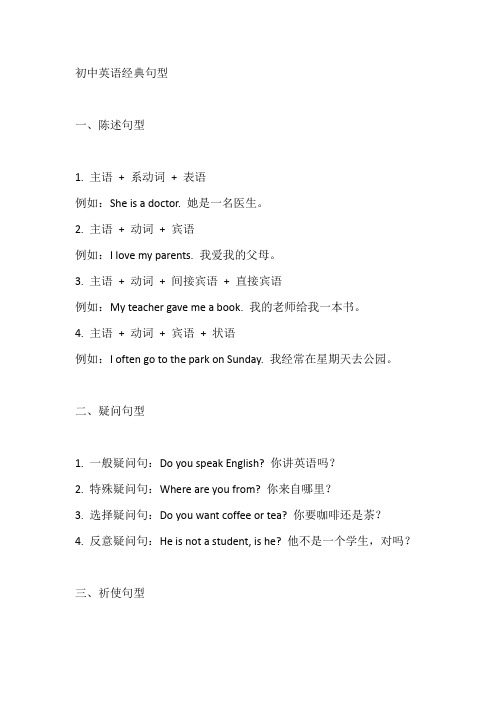
初中英语经典句型一、陈述句型1. 主语+ 系动词+ 表语例如:She is a doctor. 她是一名医生。
2. 主语+ 动词+ 宾语例如:I love my parents. 我爱我的父母。
3. 主语+ 动词+ 间接宾语+ 直接宾语例如:My teacher gave me a book. 我的老师给我一本书。
4. 主语+ 动词+ 宾语+ 状语例如:I often go to the park on Sunday. 我经常在星期天去公园。
二、疑问句型1. 一般疑问句:Do you speak English? 你讲英语吗?2. 特殊疑问句:Where are you from? 你来自哪里?3. 选择疑问句:Do you want coffee or tea? 你要咖啡还是茶?4. 反意疑问句:He is not a student, is he? 他不是一个学生,对吗?三、祈使句型1. Please + 动词原形+ 其他例如:Please sit down. 请坐。
2. Let’s + 动词原形+ 其他例如:Let’s go shopping. 我们去购物吧。
3. Be + 表语+ 其他例如:Be quiet, please. 请安静。
四、感叹句型1. What + a/an + 形容词+ 可数名词单数+ 主语+谓语!例如:What a beautiful girl she is! 她真是一个漂亮的女孩!2. What + 形容词+ 可数名词复数/不可数名词+ 主语+ 谓语!例如:What beautiful flowers they are! 这些花真漂亮!3. How + 形容词/副词+ 主语+ 谓语!例如:How beautiful the city is! 这个城市真漂亮!五、并列句型1. 并列关系:Tom is tall, but he is not strong. 汤姆个子高,但他不强壮。
中考英语重点句型(基础、对话和写作)

初中英语重要句型总结其中含有基本句型、对话句型以及写作句型:1:There+be +主语+地点状语/时间状语There's a boat in the river.河里有条船。
There are seven days in a week.一周有七天。
2:What's wrong with+sb./sth.?What's wrong with you?你怎么啦?What's wrong with your watch?你的手表有什么毛病?3:How do you like...?How do you like China?你觉得中国怎么样?4:What do you like about...?What do you like about China?你喜欢中国的什么?5:had better(not)+动词原形You'd better ask that policeman over there.你最好去问问那边的那个警察。
6:How+adj./adv.+主语+谓语!What a/an+adj.+n.+主语+谓语!How cold it is today !今天多冷啊!What a fine picture it is!多美的一幅图画呀!7:Thank+sb.+for(doing)sth.Thank you for coming to see me.感谢你来看我。
8:So+be/情态动词/助动词+主语He is a student.So am I.他是一个学生,我也是。
9:...not...until...He didn't have supper until his parents came back.直到他的父母回来他才吃饭。
10:比较级+and+比较级The baby cried harder and harder.那孩子哭得越来越厉害。
11:the +比较级,the +比较级The more one has,the more one wants.越有越贪。
初中英语常见句型归纳

初中英语常见句型归纳
1.主语+ be 动词+ 形容词
2.主语+ 动词+ 宾语
3.主语+ be 动词+ 名词
4.主语+ have/has + 宾语
5.主语+ can/may/must + 动词原形
6.主语+ should/ought to + 动词原形
7.主语+ would like/want/need + to + 动词原形
8.主语+ there be + 名词
9.主语+ be going to + 动词原形
10.特殊疑问句:疑问词+ be 动词+ 主语/其它补充说明
11.一般疑问句:be 动词/助动词+ 主语+ 其它补充说明
12.反意疑问句:陈述部分+ , + 反意疑问部分
13.祈使句:动词原形+ 其它补充说明(无主语)
14.感叹句:How + 形容词/副词/名词+ 主语+ 动词/情态动词
以上是初中英语中常见的句型归纳,需要注意的是,不同的句型在不同的语境中会有不同的用法,我们需要根据实际情况进行适当调整。
同时,英语学习也需要大量的练习和实践,只有通过不断地使用,才能够真正掌握这些句型,流利地运用它们来表达自己的思想。
初中英语重点句型总结
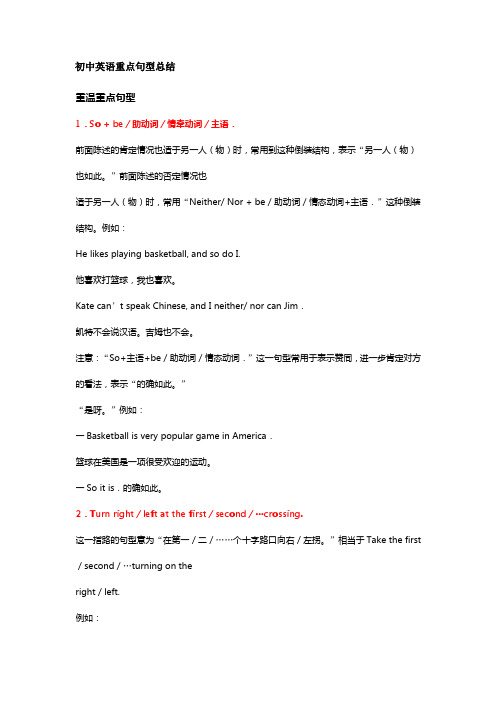
初中英语重点句型总结重温重点句型1.So + be/助动词/情牵动词/主语.前面陈述的肯定情况也适于另一人(物)时,常用到这种倒装结构,表示“另一人(物)也如此。
”前面陈述的否定情况也适于另一人(物)时,常用“Neither/ Nor + be/助动词/情态动词+主语.”这种倒装结构。
例如:He likes playing basketball, and so do I.他喜欢打篮球,我也喜欢。
Kate can’t speak Chinese, and I neither/ nor can Jim.凯特不会说汉语。
吉姆也不会。
注意:“So+主语+be/助动词/情态动词.”这一句型常用于表示赞同,进一步肯定对方的看法,表示“的确如此。
”“是呀。
”例如:一Basketball is very popular game in America.篮球在美国是一项很受欢迎的运动。
一So it is.的确如此。
2.Turn right/left at the first/second/…crossing.这一指路的句型意为“在第一/二/……个十字路口向右/左拐。
”相当于Take the first /second/…turning on theright/left.例如:一Can you tell me the way to the nearest post office?你能告诉我去最近的邮局的路吗?一Walk along this road,and turn left at the third crossing.沿着这条路走,在第三个路口向左拐。
3.It takes sb.some time to do sth.此句型表示“干某事花了某人一段时间。
”其中的it是形式主语,后面的动词不定式(短语)才是真正的主语。
例如:It took me half an hour to finish the hard work.完成这项艰巨的工作花了我半个小时。
中考英语100句重点句型
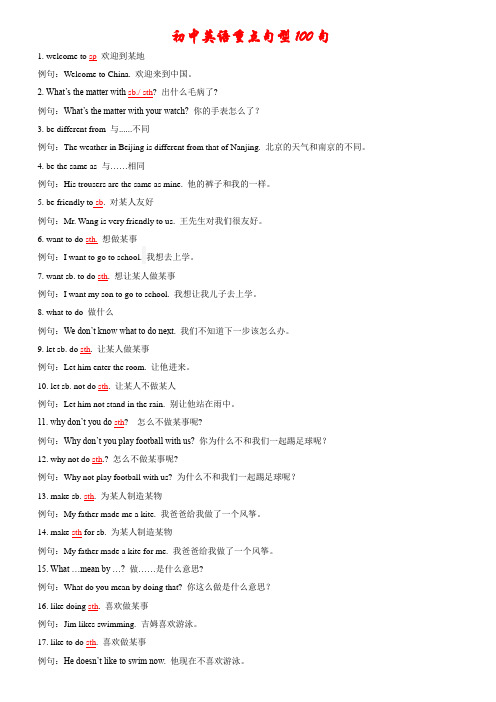
初中英语重点句型100句1. welcome to sp欢迎到某地例句:Welcome to China. 欢迎来到中国。
2. What’s the matter with sb./ sth? 出什么毛病了?例句:What’s the matter with your watch?你的手表怎么了?3. be different from 与......不同例句:The weather in Beijing is different from that of Nanjing. 北京的天气和南京的不同。
4. be the same as 与……相同例句:His trousers are the same as mine. 他的裤子和我的一样。
5. be friendly to sb. 对某人友好例句:Mr. Wang is very friendly to us. 王先生对我们很友好。
6. want to do sth.想做某事例句:I want to go to school.我想去上学。
7. want sb. to do sth. 想让某人做某事例句:I want my son to go to school. 我想让我儿子去上学。
8. what to do 做什么例句:We don’t know what to do next.我们不知道下一步该怎么办。
9. let sb. do sth. 让某人做某事例句:Let him enter the room. 让他进来。
10. let sb. not do sth. 让某人不做某人例句:Let him not stand in the rain. 别让他站在雨中。
11. why don’t you do sth?怎么不做某事呢?例句:Why don’t you play football with us?你为什么不和我们一起踢足球呢?12. why not do sth.? 怎么不做某事呢?例句:Why not play football with us? 为什么不和我们一起踢足球呢?13. make sb. sth. 为某人制造某物例句:My father made me a kite. 我爸爸给我做了一个风筝。
初中英语重点句型归纳

初中英语重点句型归纳一、陈述句型1. 主语 + be动词 + 表语例句:I am a student.2. 主语 + 动词 + 宾语例句:Tom likes playing basketball.3. 主语 + 动词 + 间接宾语 + 直接宾语例句:My mother bought me a new book.4. 主语 + 动词 + 宾语 + 宾语补足语例句:We elected him monitor.5. 主语 + 动词 + 宾语 + 宾语补足语 + 宾语补足语例句:They made him chairman.6. 主语 + do/does + not + 动词原形例句:She does not like swimming.7. Do/Does + 主语 + 动词原形例句:Do you like English?8. 主语 + have/has + 过去分词例句:He has finished his homework.9. 主语 + have/has + not + 过去分词例句:They haven't seen the film yet.10. Have/Has + 主语 + 过去分词例句:Have you ever visited Beijing?11. There be句型例句:There is a book on the desk.12. It be + adj. + 不定式例句:It is important to learn English well.13. It is + adj. + for + 人 + to + 不定式例句:It is difficult for me to solve the math problem.二、疑问句型1. Yes/No问句:句型为:Do/Does + 主语 + 动词原形?例句:Do you like English?2. 特殊疑问句:以特殊疑问词(what, where, when, why, who, how等)开头。
初中英语60个十分重要的句型

与期中考试英语满分的距离,是这60个重要的句型!之邯郸勺丸创作初中60个重要的句型,希望对大家有帮忙!1.as…as和……一样中间必须用形容词或副词原级.例如:Thisclassroom is as big as that one.这间教室和那间一样大.Heruns as fast as Tom.他和汤姆跑的一样快.否认结构:not as/so…as,“不如……”.上面的两个句子可辨别改成:Thisclassroom is not as/so large as that one.这间教室不如那间大.Hedoesn’t run as/so fast as Tom.他跑得不如汤姆快.2.as soon as一……就……用来引导时间状语从句.若主句是一般将来时,从句要用一般现在时.例如:I’lltell him the plan as soon as I see him.我一看到他就告知他这个计划.He’llgo home as soon as he finishes his work.他一完成任务就回家.3.be busy/enjoy/hate/go on/finish doing sth.忙于/喜欢/讨厌/继续/完成做某事在enjoy,finish,hate,go on,be busy等词语后,一般用动词-ing形式作宾语.例如:LinTao is busy making a model plane.林涛正忙着做飞机模型.Mymother enjoys taking a walk after supper.我妈妈喜欢晚饭后散步.I hatewatching Channel Five.我讨厌看五频道.Whensomeone asked him to have a rest,he just went onworking.当有人让他休息一会儿时,他仍继续任务.I havefinished writing the story.我已经写完了故事.4.fill…with用……装满......;be filled with 充满了……;be full of充满了......①be filled with说明由外界事物造成的此种状态,暗示主动.例如:Thebox is filled with food.盒子里装满了食物.②be full of说明主语处于的状态.此外,还可暗示程度,意为“很是”.例如:Thepatient’s room is full of flowers.那个病人的房间摆满了花.Theyoung man is full of pride.那个年轻人很是骄傲.③这两种结构还可以相互改写.例如:I fillthe box with food.The box is full of food.5.be good/bad for有利于/有害于……此句型是:be+adj.+for+n.结构.例如:Doingmorning exercises is good for your health.做早操对你的健康有益.Alwaysplaying computer games is bad for your study.总玩电脑游戏对你的学习晦气.6.be used to(doing)sth.习惯于……后必须接名词或动名词,可用于现在、过去、将来的多种时态.be可用get,become来代替.例如:He isused to life in the country.(He is used to living inthe country.)他习惯于乡村生活.Hewill get used to getting up early.他将会习惯于早起.注意:be used to do的意思是“被用来做……”.例如:Woodis used to make paper.木材被用来造纸.7.both…and…两者都……用来连接两个并列成分;当连接两个并列主语时,其后谓语动词用单数.例如:Boththe students and the teachers will go to the HistoryMuseumtomorrow.不管老师还是学生明天都会去历史博物馆.8.can’t help doing sth.禁不住做某事help在此的意思是“抑制,忍住”,其后接动词-ing形式.例如:Hisjoke is too funny.We can’t help laughing.他的笑话太有趣了,我们禁不止笑了起来.9.sth.costs sb.some money某物花费某人多少钱此句型的主语是物.cost一词带的是双宾语,它的过去式、过去分词和原型一样.Thisbook cost me five yuan.这本书花了我五元钱.10.either…or…不是……就是……,或者……或者……用来连接两个并列成分,当连接并列主语时,谓语动词与邻近的主语坚持一致.Youmay either stay here or go home.你可以呆在这儿,也可以回家.Eithershe or I am right.=Either I or she is right.不是她对就是我对.11.enough(for sb.)to do sth.足够……做……在此结构中,for用来引出不定式的逻辑主语.例如:Theice isn’t thick enough for you to walk on.这冰还没有厚到你可以在上面走的程度.12.feel like doing sth.想要做……此处like 为介词,后面跟动词-ing形式.此句型与would like to dosth.同义.例如:I feellike drinking a cup of milk.我想喝一杯牛奶.13.feel/find/think it adj./n.to do sth.认为某事……在此结构中it为形式宾语,不定式短语作真正的宾语.例如:I findit very interesting to play football.我发明踢足球很有趣.Shethinks it her duty to help us.她认为帮忙我们是她的职责.14.get ready for sth./to do sth.Getready for sth.意为“为某事做准备”;getready to dosth.意为“准备做某事”例如:We aregetting ready for the meeting.我们正在为会议做准备.Theywere getting ready to have a sports meet at that moment.他们那时正准备开运动会.15.get/receive/have a letter from收到……的来信,相当于hear fromDidyou receive a letter from John?你收到约翰的来信了吗?I gota letter from my brother yesterday.我昨天收到了我弟弟的一封来信.16.hadbetter(not)do sth.最好(别)做某事hadbetter为情态动词,其后需用动词原形.had better经常使用缩写,酿成’d better,其否认形式是在其后直接加not.例如:We hadbetter go no w.=We’d better go now.我们最好现在走吧.You’dbetter not go out because it is windy.今天起风,你最好别出去了.17.havesth.done使(某事)完成(动作由他人完成)sth.为宾语,done为过去分词作补语.例如:We hadthe machine repaired.我们请人把机器修好了.注意区分:We haverepaired the machine.我们(自己)已经修好了机器.18.help sb.(to)do sth./with sth.帮忙某人(做)某事,其中的to可以省略.例如:Ioften help my mother with housework.我经常帮忙妈妈做家务.Wouldyou please help me(to)look up these words?请你帮忙我查查这些词好吗?19.How do you like……?你认为……怎么样?与what do you think of…?同义.例如:How doyou like the weather in Beijing?你认为北京的天气怎么样?你觉得这部新电影如何?20.I don’t think/believethat…我认我/相信……不……其中的not是对宾语从句进行否认而不是对主句否认(否认前移).that可省略.例如:Idon’t think it will rain.我认为天不会下雨.Idon’t believe the girl will come.我相信那女孩不会来了.21.It happens that…碰巧……相当于happen to do例如:Ithappened that I heard their secret.可改写为:I happened tohear their secret.我碰巧听到了他们的秘密.22.It’s/has been+一段时间+since从句自从某时起做某件事情已经一段时间了该句型中since引导的时间状语从句经常使用一般过去时.例如:It’s twentyyears since he came here.他来这里已经20年了.It hasbeen six years since he married Mary.他和玛丽结婚已经六年了.23.It is+adj./n.+for sb.to do sth.做某事对某人来说……It是形式主语,真正的主语是不定式todo sth.例如:It’snot easy for us to study English well.对我们来说学好英语其实不容易.It’s agood idea for us to travel to the south.去南方旅行对我们来说是个好主意.24.It’s+adj.+of sb.to do sth.It是形式主语,to dosth.是真正的主语,当表语(即形容词)能对逻辑主语描述时,经常使用介词of,而不必for.例如:It’svery polit e of you to give your seat to old people.你给老人让座,很是有礼貌.25.Itseems/appears(to sb)that…(在某人看来)好像……此句中的it是主语,that引导的是表语从句.例如:Itseems that he islying.看样子他好像是在撒谎.Itappears to me that he never smiles.在我看来,他从来没有笑过.26.It is+数词+metres/kilometerslong/wide………是多少米(千米)长(宽)用来暗示物体的长(宽,高),如数词大于一,名词要用单数.例如:Itis20 metres long from this end to that end.从这端到那端有二十米长.27.It’s time for sb.to do sth.是某人干某事的时候了it是形式主语,真正的主语是动词不定式to do sth.例如:It’stime for the child to go to bed.孩子该睡觉了.比较下面两种结构:①It’s time for+n.例如:It’stime forschoo l.②It’s time to dosth.例如:It’stime to go to school.28.It takes sb.some time to do sth.花费某人多少时间做某事it是形式主语,真正的主语是动词不定式to do sth.例如:Ittakes her fifteen minutes to walk to the bus stop fromhere.从这儿走着到公交车站将花费她15分钟.Ittook the old man three days to finish the work.那个老人花了三天时间完成这项任务.29.keep(on)doing sth.一直坚持做某事keepdoing sth.一般用于静态动词.keep on doingsth.意为“继续不断地做某事”,一般用于动态动词,但两者的区别其实不是很严格,有时可以互换.例如:Don’tkeep on doing such foolish things.不要再做这样的傻事了.Hekept sitting there all day.他整天坐在那里.30.keep…from doing sth.阻止......做某事相当于stop…from doingsth.,prevent…from doing sth.在主动句中,stop和prevent后面的from可以省略,但在主动结构中,from 不成以省略.例如:Pleasekeep the children from swimming in the sea.请别让孩子到海里游泳.Thebig noise outside my room stopped me from doing myhomework.屋外巨大的噪音使我不克不及做作业.31.keep sb.doing sth.让某人一直做某事不成和keep sb.fromdoing sth.结构混淆.例如:Why doyou keep me waiting for a long time?你为什么让我等了很长时间?32.make sb.do sth.使某人干某事make意为“使”时,其后要有不带to的动词不定式.例如:Hemade me work ten hours a day.他让我每天任务10小时.注意:上句如改成主动语态,则work前的to不克不及省略.例如:I wasmade to work ten hours a day.33.neither…nor…既不……也不……当连接两个并列主语时,谓语动词与邻近的主语取得一致(就进一致原则).例如:Neitherwe nor Jack knows him.我们和杰克都不认识他.Heneither knows nor cares what happened.他对产生的事情不理不睬.34.not…until…直到……才......until后可跟名词或从句,暗示时间.例如:Hedidn’t come until late in the evening.他直到晚上很迟才来.Hedidn’t arrive until the game began.直到角逐开始他才来.35.sb.pays money for sth.某人花钱买某物此句型主语是人.例如:I’vealready paid 2,000 yuan for the motor bike.我已经花了2000元买这辆摩托车.36.spend time/money on sth./(in)doing sth.花费(时间、钱)在某事上/做某事其中in可以省略,通常主语为“人”.例如:Ispent five yuan on this book.我在这本书上花了五元钱.Ispent two hours(in)doing my homework yesterday.昨晚我花了两个小时做作业.37.so…that…太……以至于……用于复合句,that引导的是结果状语从句.so是副词,后面应接形容词或副词,如果接名词,应用such.例如:Theice is so thin that you can’t walk on it.冰太薄了,你不克不及在上面走.He issuch a kind man that we all like him.他是一个很是好的人,我们都很喜欢他.38.stop to do sth.,stop doing sth.Stopto do sth.意为“停下来去做另一件事”,stopdoing sth.意为“停止正在做的事”例如:You’retoo tired.You’d better stop to have a rest.你们太累了,最好停下来休息一会儿.Theteacher is coming.Let’s stop talking.老师来了,咱们别说话了.39.Thank you for doing sth.感谢你做了……for之后除了加动名词doing外,还可以加名词.例如:Thankyou for giving me the present.谢谢你给我的礼物.Thankyou for your help.=Thank you for helping me.谢谢你的帮忙.40.thanks to多亏……,由于……thanks后的s不克不及省略,to是介词.例如:Thanksto my friend Jim,I’ve worked out thisproblem.多亏了我朋友吉姆的帮忙,我已经解决了这个问题.41.There be句型①在此结构中,there是引导词,在句中不克不及充当任何成分,也不必翻译出来.句中的主语是某人或某物,谓语动词be要与主语的数坚持一致.例如:Thereis a man at the door.门口有一团体.当主语是由两个或者两者以上的名词充当时,谓语动词be要跟它邻近的那个名词的数一致(就近一致).例如:Thereare two dogs and a cat under the table.桌下有两只狗和一只猫.比较:There is a catand two dogs under thetable.②T here be句型中的be不克不及用have来代替,但可以用lie(位于,躺),stand(矗立),exist(生存),live(生活)等词来替换.例如:Therestand a lot of tall buildings on both sides of thestreet.街道两旁矗立着许多高楼.Therelies lake in front of our school.我们学校前面有一个湖.Oncethere lived a king here.这儿曾有一个国王.Thereis going to be a sports meeting next week.下周准备开一个运动会.Therebe的拓展结构:thereseem(s)/happen(s)to be…Thereseems to be one mistake in spelling.似乎有一处拼写错误.Therehappened to be a ruler here.这儿碰巧有把尺子.Thereseemed to be a lot of people there.那儿似乎有很多人.42.The+adj.比较级,the+adj.比较级越……,越……此句型暗示一方随另一方的变更而变更.例如:Theharder he works,the happier he feels.他任务越努力,就感应越幸福.Themore,the better.多多益善.43.too+adj./adv.+to do sth.太……以至于不克不及…….此句型为简单句,后面的to暗示否认含义.例如:Theice is too thin for you to walk on.这冰太薄,你不克不及在上面走.Thebag is too heavy to carry.这个袋子太重搬不动ed to do sth.过去经常做某事usedto是情态动词,暗示过去的习惯动作或状态,现在已不存在,因此只用于过去时态.例如:Heused to get up early.他过去总早起.When Iwas young,I used to play tennis very often.我年轻时经常打网球.否认形式有两种:didn’t useto;used not to,例如:Hedidn’t use to come.=He usedn’t to come.他过去不常来.45.what about…?……怎么样?后面可接名词、代词、动名词等.与“how about…?”同义.例如:Wehave been to Hainan.What about you?我们去过海南,你呢?Whatabout going to the park on Sunday?星期天去公园怎么样?46.What day/date is it today?今天星期几(几月几日)?—Whatday is it today?—Sunday.—Whatdate is it today?—June24th.47.What’s wrong(the matter)with…?……怎么了?What’swrong with you,Madam?夫人,您怎么了?Youlook worried.What’s wrong with you?你看上去很焦急,出什么事了?48.Why not do…?为什么不做……?谓语动词用原形.与Why don’t youdo…?同义.例如:Whynot go to see the film with us?=Why don’t you go tosee the film withus?为什么和睦我们一起去看电影呢?49.would like to do sth.想做……后用动词不定式作宾语.例如:Iwould like to drink a cup of tea.我想喝一杯茶.疑问句式:Would you like(to drink)a cup of tea?你想喝杯茶吗?50.adj./adv.比较级+and adj./adv.比较级越来越......若形容词/副词为双音节词及多音节词,则这一结构变成“more and more+形容词/副词”.例如:It’sgetting warmer and warmer.天气变得越来越暖和了.Thelittle girl becomes more andmore beautiful.小女孩变得越来越漂亮了.51.adj.比较级+thanthan引导的是典型的比较级句型,暗示“一者比另一者……”,其前用形容词或副词的比较级,than从句可以用省略形式.例如:I knowyou better than she does.我比她更了解你.Thishouse is bigger than that one.这所屋子比那所屋子大.52.though-从句though引导的是让步状语从句,意思是“虽然……但是……”.但不克不及和but连用,英语中表达“虽然……,但是……”时,though和but只能用一个.例如:Thoughit was snowing,it was not very cold.虽然下着雪,可其实不太冷.I waslate for the last bus though I hurried.虽然我拼命赶路,还是没搭上最后一班公交车.Wedidn’t feel tired though we walked a long way.虽然我们走了很长的路程,但是并没有感应累.53.if-从句If引导的是条件状语从句,“如果;假如“.如主句用一般将来时,if从句要用一般现在时(主将从现).例如:If Igo to the Great Wall tomorrow,would you like to comealong?如果明天我去长城,你会和我一起去吗?If itrains tomorrow,I won’t go.如果明天下雨,我就不去了.54.because-从句引导原因状语从句,“因为”.例如:Hedidn’t hear the knocking at the door because he waslistening to theradio.他没有听见敲门声,因为他正在听收音机.55.so+do/be+主语“So+be/助动词/情态动词+主语”暗示前面所述内容也适用于另一人或物.be、助动词或情态动词的选择视前面陈述句中谓语动词的时态形式而定.例如:Helikesfootball and so do I.他喜欢足球,我也如此.Jimwas playing football just now and so was Tom.方才吉姆在踢足球,汤姆也在踢足球.比较:“So+主语+be/助动词/情态动词.”结构,是用来证实前一句所表达的内容(起强调作用).be、助动词或情态动词的选择视前面陈述句中谓语动词的时态形式而定.A:Itis very hot today.今天天气很热.B:Soit is.确实如此.56.not only…but also…不单……并且……经常使用来连接语法作用相同的词、短语或句子.连接两个主语时,谓语动词要和紧靠它的主语在人称和数上坚持一致.例如:Shelikes not only singing but also dancing.她不单喜欢唱歌,并且喜欢跳舞.He isnot only a good doctor but also a good father.他不单是个好医生并且是个好爸爸.Notonly I but also he is hoping to go there.不单我并且他也想去那儿.57.prefer…to…喜欢……胜过…...prefer(doing)sth.to(doing)sth.意为“两者相比更喜欢(做)其中之一”.在此结构中,to是介词,接名词或动名词,结构中前后所跟成分一样.例如:Heprefers tea to coffee.茶与咖啡相比,他更喜欢茶.Heprefers doing shopping to going fishing.购物与钓鱼相比,他更喜欢购物.58.感慨句型:What(a/an)+adj.+n.+主语+谓语!How+adj./adv.++主语+谓语!What aclever boy(he is)!=How clever the boy is!这个男孩儿多聪明啊!What awonderful film we saw last night!昨天晚上我们看的电影多精彩啊!Howlovely the weather is!天气多好。
初中英语50个必考句型

句型12:…as+adj./adv.+as…
…not as(so)+adj./adv.+as…
Last Sunday the weather was not so wet as it is today.
上个星期天的天气不如今天的天气潮湿。
句型13:more/less +adj.+than…
You must keep your classroom clean.
你们必须保持教室干净。
Sorry to have kept you waiting.
对不起,让你久等。
句型32:find+宾语+宾补
He finds it very hard to travel around the big city.他发现要环游这个大城市是很难的。
We're going to have fun learning English this term.
这学期我们将兴味盎然地学习讲英语。
句型25:…because…/…, so..…
I don't know all your names because this is our first lesson.
句型18:…as soon as…
As soon as I see him, I'll give him the message.
我一见到他就把你的消息告诉他。
句型19:so+adj./adv.+that…
I was so tired that I didn't want to speak.
我累得连话也不想说了。
在你们家乡,春天天气怎么样?
初中英语重点句型归纳
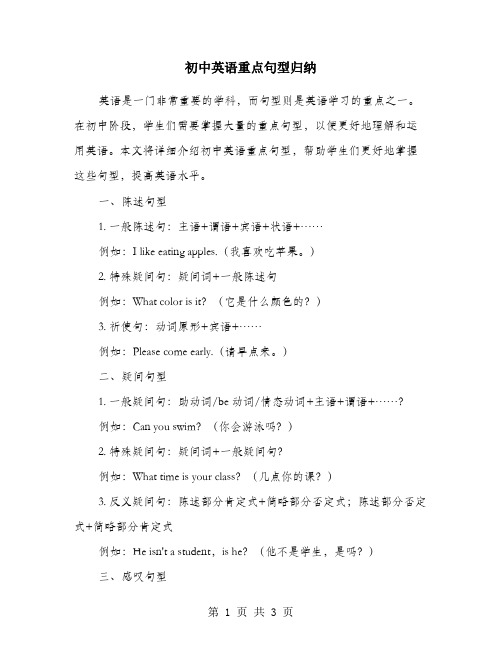
初中英语重点句型归纳英语是一门非常重要的学科,而句型则是英语学习的重点之一。
在初中阶段,学生们需要掌握大量的重点句型,以便更好地理解和运用英语。
本文将详细介绍初中英语重点句型,帮助学生们更好地掌握这些句型,提高英语水平。
一、陈述句型1. 一般陈述句:主语+谓语+宾语+状语+……例如:I like eating apples.(我喜欢吃苹果。
)2. 特殊疑问句:疑问词+一般陈述句例如:What color is it?(它是什么颜色的?)3. 祈使句:动词原形+宾语+……例如:Please come early.(请早点来。
)二、疑问句型1. 一般疑问句:助动词/be动词/情态动词+主语+谓语+……?例如:Can you swim?(你会游泳吗?)2. 特殊疑问句:疑问词+一般疑问句?例如:What time is your class?(几点你的课?)3. 反义疑问句:陈述部分肯定式+简略部分否定式;陈述部分否定式+简略部分肯定式例如:He isn't a student,is he?(他不是学生,是吗?)三、感叹句型1. What+a/an+形容词+可数名词单数+主语+谓语!例如:What a beautiful flower it is!(多么美丽的花啊!)2. How+形容词/副词+主语+谓语!例如:How fast he runs!(他跑得多快啊!)四、强调句型It is/was+被强调部分(主语/宾语/状语)+that/who+其他部分。
这个句型用于强调句中,强调某个成分时,一定要注意语序和时态。
被强调部分可以是主语、宾语或状语等。
强调主语时,可以用“Itis/was the +名词词组”来表达;强调宾语时,可以用“It was/is the (an) +形容词+名词词组+that”来表达;强调状语时,则要注意改变句子结构和时态。
这个句型在使用时需要注意一些固定用法和特殊用法。
初中英语高频考点的60个句型总结

初中英语高频考点的60个句型总结1. as…as 和……一样中间必须用形容词或副词原级。
例如:This classroom is as big as that one.这间教室和那间一样大。
He runs as fast as Tom. 他和汤姆跑的一样快。
否定结构:not as/so…as,“不如……”。
上面的两个句子可分别改为:This classroom is not as/so large as that one.这间教室不如那间大。
He doesn’t run as/so fast as Tom.他跑得不如汤姆快。
2. as soon as 一……就……用来引导时间状语从句。
若主句是一般将来时,从句要用一般现在时。
例如:I’ll tell him the plan as soon as I see him.我一看到他就告诉他这个计划。
He’ll go home as soon as he finishes his work.他一完成工作就回家。
3. be busy/enjoy/hate/go on/finish doing sth. 忙于/喜欢/讨厌/继续/完成做某事在enjoy, finish, hate, go on, be busy等词语后,一般用动词-ing形式作宾语。
例如:Lin Tao is busy making a model plane.林涛正忙着做飞机模型。
My mother enjoys taking a walk after supper.我妈妈喜欢晚饭后散步。
I hate watching Channel Five.我讨厌看五频道。
When someone asked him to have a rest, he just went on working.当有人让他休息一会儿时,他仍继续工作。
I have finished writing the story.我已经写完了故事。
- 1、下载文档前请自行甄别文档内容的完整性,平台不提供额外的编辑、内容补充、找答案等附加服务。
- 2、"仅部分预览"的文档,不可在线预览部分如存在完整性等问题,可反馈申请退款(可完整预览的文档不适用该条件!)。
- 3、如文档侵犯您的权益,请联系客服反馈,我们会尽快为您处理(人工客服工作时间:9:00-18:30)。
重点句型1. …as soon as… 一… 就…Mary一见到她弟弟就会告诉他这个消息。
Mary will tell her brother this message as soon as she sees him.我们一到那儿就去爬山了。
We went climbing as soon as we arrived / got / reached there.2. as + adj./adv.+ as… …和…一样(的/ 地)…not as(so)…as… …不如/ 不比… ….李雷和吉母跑得一样快。
Li Lei runs as fast as Jim.约翰和你的年龄不一样大。
John is not as (so) old as you.这部电视剧不如那部有趣。
(TV series)This TV series is not as (so) interesting as that one.3. as +adj./adv.+ as possible 尽可能… 的/ 地…我们在英语课上应该尽可能地多讲英语。
We should speak English as much as possible in English class.你能不能尽可能慢一些读这个句子?Can you read the sentence as slowly as possible?4. ask sb for sth 向某人要求某物你迷路时,你可以向警察需求帮助。
When you get lost, you can ask the police for help.一些学生经常向父母要钱去玩电子游戏。
(video games)Some students often ask their parents for money to play video games.他向父母要一辆自行车作为生日礼物。
He asked his parents for a bicycle as his birthday present.5. ask/ tell sb. (how) to do sth 询问/ 告诉某人如何做某事许多学生经常问老师如何才能学好英语。
Many students often ask their teachers how to learn English well.让我来告诉你如何发邮件。
Let me tell you how to send an e-mail.6. ask / tell /want sb (not) to do sth. 要求(让)/ 告诉/ 想要某人做(不做)某事护士告诉我服用此药需一日三次,饭后服用。
The nurse told me to take this medicine three times a day after meals.老师经常告诉我要更加努力地学习。
The teacher often tells me to study harder.他让我不要再犯同样的错误。
He asked me not to make the same mistake again.7. make/ let /have sb. (not) do sth 使/ 让某人做(不做)某事他使得孩子哭得很厉害。
He made the child cry loudly.昨天他使我在影院门口等了很长时间。
He made me wait for long (for a long time) at the gate of the cinema yesterday.直到我们做完了作业,妈妈才让我们去玩球。
Mother didn’t let us play football until we finished our homework.那个老板迫使工人们每天工作10小时。
That boss made the workers work (for) ten hours a day.8. be afraid of doing / to do/that 害怕/ 不敢做某事这个小女孩不敢晚上出去。
The little girl is afraid to go out in the evening / at night.他害怕独自呆在家里。
He is afraid of staying at home alone.许多人担心他们会失去工作。
(be afraid that)Many people are afraid that they will lose their jobs.9. be busy with sth. / doing sth. 忙于某事/ 做某事现在学生们忙于准备考试。
Now students are busy preparing for the exams.昨天下午妈妈都在忙着做家务。
(两种)Mother was busy with housework yesterday afternoon.Mother was busy doing housework yesterday afternoon.10. be famous / late /ready / sorry for sth.因…而著名/ (做)…迟到了/ 晚了/ 为…准备/ 为… 而抱歉如果你不快点,你就会上班迟到。
If you don’t hurry, you will be late for work.杭州以丝绸而出名。
Hangzhou is famous for silk.我们已经准备好迎接奥运会了。
We have been ready for the Olympic Games.我为我的错误而抱歉。
I am sorry for my mistake.11. be glad that 很高兴…我很高兴你能来参加晚会。
I am very glad that you can come to the evening party.老师很高兴我们班得了第一名。
The teacher was very glad that our class was the first / won the first prize.12. give/ show/ bring/ lend/ send/ pass/ tell / offer sth to sbbuy/give/ show/ send/ pass/ bring/ lend/ tell sb. sth给某人某物;给某人看某物;给某人带来某物;借给某人某物;送给某人某物;递给某人某物;把某事告诉给某人;主动给某人某物请递给我一张纸。
Please pass me a piece of paper. =Please pass a piece of paper to me. 请把你的画给我看看。
Please show me your picture. =Please show your picture to me 他借给我一辆自行车。
He lent me a bike. =He lent a bike to me.别忘了下次来给我带点儿钱。
Don’t forget to bring me some money when you come here next time.= Don’t forget to bring some money to me when you come here next time.13. either…or… 或… 或…, 不是… 就是…, 要么…要么…不是你,就是他是对的。
Either you or he is right. V. 就近原则每个周末,我们要么去公园,要么呆在家里。
We either go to a park or stay at home every weekend. (at/on weekends.)要了解世界,人们既可以读报纸,也可以看电视。
People can either read newspapers or watch TV to get to know the world.14. n either…nor… 既不… 也不…, 两者都不…我和他都没有读过这本书Neither he nor I have ever read this book. V. 就近原则这个女孩已经十岁了,但她既不会读书,也不会写字。
The girl is already ten, but she can neither read nor write.15. enjoy/ finish/mind/ keep/ practice/go on doing sth.享受做…之乐;做完某事;介意做某事;一直做某事;练习做某事;继续做…我们应该经常练习讲英语。
We should often practice speaking English.我奶奶一直坚持早晨锻炼身体已经有十年了。
My grandma has kept doing exercise in the morning for ten years.16. find /think / feel + it + adj. (for sb.)to do sth. 发现/ 认为/觉得做某事如何越来越多的人发现吃太多汉堡包不利于健康。
More and more people have found it unhealthy to eat too many hamburgers.很多大学生发现在大学中交友很难。
A lot of students have found it very hard to make friends at college.17. get + adj. 的比较级+ and + adj. 的比较级变得越来越…地球变得越来越暖和了。
It gets warmer and warmer on the earth.春天到了,天气变得越来越热了。
Spring is coming and it’s getting warmer and warmer.北京变得越来越美丽了。
Beijing is becoming more and more beautiful.18. The + adj./adv.的比较级,the + adj./adv.的比较级。
越..., 就越…。
天气越冷,人们穿得就越多。
The colder it is, the more people wear.我们种的树越多,空气就会越干净。
The more trees we plant, the cleaner the air will be.英语,我们练习得越多,说得就越好。
